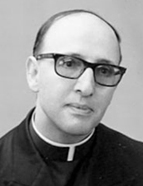

Among his historian pupils, António Reis has expressed his indebtedness to the discussion of the theory of history and, specifically, the use of the concept of culture. Matos Ferreira, in turn, recalls the master as the transmitter of the awareness that the "intellectual or historian" must first and foremost "understand what is being said by others or by the document” (Um pedagogo…, 2011, pp. 377-378, 189-190, 229).
As also emphasized by this same historian, "one cannot place him in the framework of the priests who, at the end of the 1960s, protested against the political society and the Catholic Church", but Father Manuel Antunes "brought the possibility of reflecting on certain themes" which, according to Luís Barreto, were approached "with different and even opposite theories and schools, methods and results", therefore, with total "freedom to discuss Marxism, Freud and Lacan, anarchism and atheism".” (Idem, p. 212). Nothing is known of his political inclination, neither before nor after 1974. The students refer to his "superiority in relation to the regime" and strength of character to keep the agents of the Polícia Internacional e de Defesa do Estado (PIDE) [International and State Defence Police] out of his classes. In this regard, Fernando Dacosta describes Manuel Antunes as "neither orthodox nor heterodox, but rather a paradox", someone who sought to "analyse one part of reality and then its opposite"” (Idem, p. 141-142; 182). Politically, Ramalho Eanes considers that "he was open to dialogue with everyone, whether from the right or the left", but Medeiros Ferreira is inclined to consider him a "left-wing man". (Idem, 348-349; 364). In 1976, “at the request of Vítor da Cunha Rego (Mário Soares’ right-hand man)” he was invited to found the centre of a short-lived Fundação de Ciências Políticas [Political Science Foundation], which was launched the following year with the support of Bernardino Gomes (Socialist Party), Francisco Pinto Balsemão and Manuel Castelo Branco (Social Democratic Party). It is now known that he was invited to become Minister of Education in 1978 to replace Sottomayor Cardia, although not much is known about the circumstances of this invitation, which he declined for health reasons. Despite not holding any office, his advice was sought by President Ramalho Eanes (1976-1986) (Idem, pp. 330; 350-ff).
His election as Corresponding Member of the Academia Portuguesa de História [Portuguese Academy of History] (1967), his Doctorate Honoris Causae (1981) awarded by the Universidade de Lisboa, and his decoration as Grande Oficial da Ordem da Torre e Espada, do Valor, Lealdade e Mérito [Grand Officer of the Order of the Tower and Sword of Valour, Loyalty, and Merit] (1983), granted by the President of the Republic, in recognition of his value as an educator and intellectual are worthy of mention.
